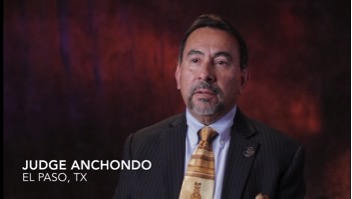If you are having trouble viewing the email below, please click here
|
||||
April 2016IN THIS ISSUE• DOJ/SAMHSA Blog: National Reentry Week – An Essential Part of Our Mission • Upcoming Webinar: Screening and Assessment of Co-Occurring Disorders in the Justice System • Judges Corner: Judicial Perspectives on Treatment Courts • Dreamland: The True Tale of America's Opiate Epidemic • SAMHSA Announces FY 2016 Assisted Outpatient Treatment Grant Program • Justice and Mental Health Collaboration Program Grant Announcement • Sequential Intercept Mapping in Kern County, California • Safety and Justice Challenge Grantees Announced • Joint Adult Drug Court Solicitation to Enhance Services, Coordination, and Treatment • The GAINS Center's Website Has Moved to SAMHSA.gov NEW PUBLICATIONSScreening and Assessment of Co-Occurring Disorders in the Justice System UPCOMING EVENTSNational Association of Drug Court Professionals (NADCP) 22nd Annual Training Conference/Vet Court Con Mental Health America Annual Conference NAMI National Convention National Commission on Correctional Health Care (NCCHC) Correctional Health Care Leadership Institutes American Correctional Association (ACA) 146th Congress of Correction American Probation and Parole Association (APPA) 41st Annual Training Institute International Center of Mental Health Policy and Economics (ICMPE) American Public Health Association (APHA) Annual Meeting and Expo |
SIM Workshops Helping Communities Address the Behavioral Health Needs of People Who Come into Contact with the Criminal Justice System
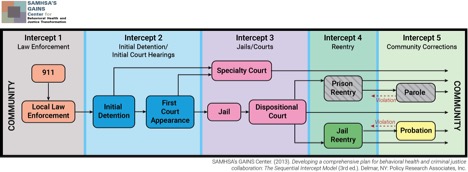
The Sequential Intercept Model is being used by many communities as a guide to behavioral health service system transformation, and more specifically as a tool to identify strategies to better respond to the needs of people with behavioral health conditions who come into contact with the criminal justice system. The model helps communities to assess where diversion programs may be developed, how institutions can improve treatment services, when to begin activities to facilitate reentry, and how to provide appropriate supervision and support in the community.
Sequential Intercept Mapping (SIM) is a one and a half day workshop that involves developing a map that illustrates how people with behavioral health conditions come in contact with and flow through the criminal justice system. Through the workshops, facilitators and participants identify opportunities for linkage to treatment and other services, and for prevention of further penetration into the criminal justice system. SIM workshops have three primary objectives:
| • | Development of a comprehensive map of how people with behavioral health conditions flow through the criminal justice system along five distinct intercept points: Law Enforcement, Initial Detention and Initial Court Hearings, Jails and Courts, Re-entry, and Community Corrections. | ||
| • | Identification of gaps, resources, and opportunities at each intercept for individuals in the target population. | ||
| • | Development of priorities for activities designed to improve system and service level responses for individuals in the target population. |
SAMHSA's GAINS Center recently facilitated several SIM workshops.
On March 16-17, 2016, a SIM Workshop was held in Montgomery County, AL. PRA Senior Project Associates Dan Abreu and Travis Parker led the workshop, which was held at the offices of the Montgomery Area Mental Health Authority. Approximately 30 people participated in the workshop. In addition to representatives from the Montgomery Area Mental Health Authority, participants included the Healthy Minds Network, Montgomery County Sheriff's Office, Montgomery Police Department, Montgomery County District Attorney's Office, Montgomery County Public Defender's Office, Montgomery Housing Authority, probation and parole officers, hospital staff, judges and court personnel, and local community organizations.
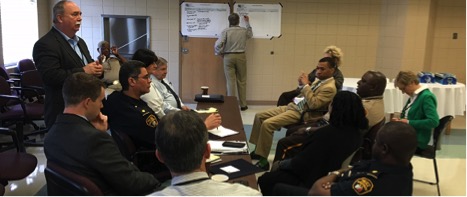
Some of the priorities that the group identified included increasing the availability of housing, expanding crisis services, and developing a cross-system data sharing system.
For additional information, we encourage you to read an article that was published in the Montgomery Advertiser about the workshop.
On March 22-23, 2016, a SIM Workshop was held in Pettis County, MO. PRA Senior Project Associate Travis Parker and Senior Consultant Connie Milligan led the workshop. Over 45 people participated including representatives from the Missouri Department of Mental Health, Pettis County Sheriff's Office, Sedalia Police Department, Missouri State Highway Patrol, Montgomery County District Attorney's Office, Montgomery County Public Defender's Office, Sedalia Housing Authority, Social Security Administration, local legislators, probation and parole officers, hospital staff, judges and court personnel, and various treatment and service provider organizations.
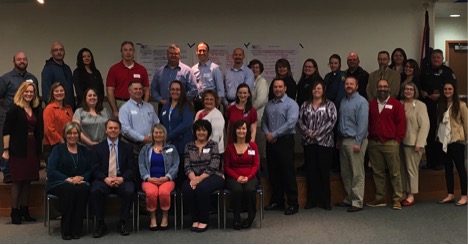
Some of the priorities that the group identified included establishing a crisis center where law enforcement and other crisis responders can bring people in crisis and get them connected with treatment and other services, developing mental health court, expanding diversion opportunities, and creating a community mental health liaison position to work directly people with behavioral health conditions who are involved in the criminal justice system.
For additional information, we encourage you to read an article that was published in the Sedalia Democrat about the workshop.
On April 12-13, 2016, a SIM Workshop was held in Craighead County, AR. PRA Senior Project Associate Travis Parker and Senior Consultant Connie Milligan led the workshop, which was held at the offices of the Mid-South Health Systems in Jonesboro, AR. Approximately 30 people participated in the workshop. In addition to representatives from the Mid-South Health Systems, participants included the Craighead County Sheriff's Office, Craighead County Detention Center, Craighead County Public Defender's Office, Arkansas State University, probation and parole officers, emergency services, hospital staff, judges and court personnel, and local community organizations.
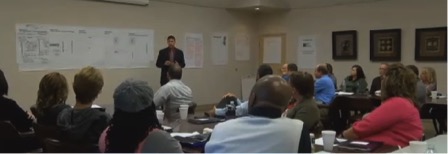
Some of the priorities that the group identified included establishing a crisis stabilization unit, creating shelters and other forms of emergency housing, and medication bridging.
For additional information, we encourage you to check out Region 8 News' coverage of the workshop.
Following SIM workshops, the GAINS Center provides each community with a map of their criminal justice system, as well as a report that includes findings and recommendations. The GAINS Center will continue to work with additional communities in the future to help them meet the needs of people with behavioral health conditions involved with the criminal justice system.
DOJ/SAMHSA Blog: National Reentry Week – An Essential Part of Our Mission

An introduction by Jennie Simpson, Ph.D., Office of Policy, Planning, and Innovation, Substance Abuse and Mental Health Services Administration
At SAMHSA, we know that people recover. For people in the justice system with mental and substance use disorders, successful reentry is an important part of the recovery process. In recognition of National Reentry Week (April 24th-30th, 2016), SAMHSA is proud to share this Key Issue guide, "Reentry Resources for Individuals, Providers, Communities, and States." For information on reentry and behavioral health, see SAMHSA's Criminal and Juvenile Justice Activities. For more information on National Reentry Week and related activities, please see the Department of Justice's announcement (see below).
Under the Obama Administration, the Department of Justice has taken major steps to make our criminal justice system fairer, more efficient, and more effective at reducing recidivism and helping formerly incarcerated individuals contribute to their communities. An important part of that task is preparing those who have paid their debt to society for substantive opportunities beyond the prison gates, and addressing obstacles to successful reentry that too many returning citizens encounter.
Addressing the challenges that formerly incarcerated individuals experience is a vital and pressing task. Each year, more than 600,000 individuals return to our neighborhoods after serving time in federal and state prisons, and another 11.4 million individuals cycle through local jails. Nearly a quarter of Americans has had some sort of encounter with the criminal justice system – mostly for relatively minor, non-violent offenses, and sometimes from decades in the past. But whether an arrest occurred recently or long ago, individuals with criminal records, and particularly recently-incarcerated individuals, face serious and complex obstacles to successful reentry. The long-term impact of a criminal record prevents many motivated people from obtaining employment, housing, higher education, and credit – and these barriers affect returning individuals even if they have turned their lives around and are unlikely to reoffend. Ultimately, these barriers can contribute to a cycle of incarceration that makes it difficult for even the most well-intentioned individuals to stay on the right path and stay out of the criminal justice system.
At the Department of Justice, supporting successful reentry is an essential part of our mission to promote public safety – because by helping individuals return to productive, law-abiding lives, we can reduce crime across the country and make our neighborhoods better places to live. That's why we have made more than $400 million in Second Chance Act funds available since 2009 to support comprehensive adult and juvenile reentry services. It's why we have been working through the Federal Interagency Reentry Council – which I have the privilege of chairing – to reduce policy barriers to successful reentry, opening up opportunities in education, job placement, housing, healthcare, and a host of other areas critical to successful reintegration. And it's why we are raising awareness of the importance of reentry strategies that both increase public safety and fulfill our nation's commitment to the promise of individual redemption.
To encourage and highlight this important work, the Justice Department is designating the week of April 24-30, 2016, as National Reentry Week. During this week, we are asking the Bureau of Prisons to coordinate reentry events at their facilities across the country – from job fairs, to practice interviews, to mentorship programs, to events for children of incarcerated parents – designed to help prepare inmates for release. We have also asked each U.S. Attorney's Office to coordinate reentry events, including meetings between local reentry stakeholders, reentry court proceedings, employer roundtables or other events designed to raise awareness about the importance of reentry work. We are encouraging federal partners and grantees to work closely with stakeholders like federal defenders, legal aid providers, and other partners across the country to increase the impact of this effort. And Justice Department and Administration leadership will travel during National Reentry Week in support of these events.
I am proud of the great strides we have already made and excited about the work still to come. And I am certain that if we work together, we can reduce crime and protect our communities by preparing individuals for success outside prison walls. As we go forward, the Department of Justice will continue to support and advance reentry programs that promote opportunity, bolster public safety, and give formerly incarcerated individuals the full chance they deserve to rejoin our communities and strengthen our nation.
Written by Attorney General Loretta E. Lynch
Upcoming Webinar: Screening and Assessment of Co-Occurring Disorders in the Justice System
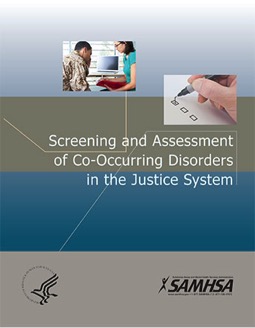
The Substance Abuse and Mental Health Services Administration (SAMHSA) recently released a new publication, "Screening and Assessment of Co-Occurring Disorders in the Justice System," which examines a wide range of evidence-based practices for screening and assessment of adults in the justice system who have co-occurring mental and substance use disorders. SAMHSA's GAINS Center contributed to the development of the publication.
The publication is available through the SAMHSA Store, and can be downloaded via the following link:
Screening and Assessment of Co-Occurring Disorders in the Justice System
The GAINS Center will be hosting a webinar featuring Roger H. Peters, Ph.D., of the University of South Florida, that will provide participants with an understanding of best practices in screening and assessment for co-occurring disorders in the justice system. Dr. Peters will examine issues specific to each Intercept and address questions regarding screening and assessment for mental disorders, substance use disorders, posttraumatic stress disorders and traumatic histories, and treatment motivation. The webinar will be held on May 26, 2016, from 2:00 - 3:30 PM EDT. If you are interested in attending the webinar, please register by clicking on the link below.
Click Here to Register
The GAINS Center will also host a series of intercept specific discussion groups. Details regarding the discussion groups will be released following the webinar.
Judges Corner: Judicial Perspectives on Treatment Courts
The Judges Corner is a recent addition to the GAINS Center's eNewsletter that will explore judicial perspectives on a variety of topics related to treatment courts. Through a series of short video clips captured from interviews with judges, we will explore judges' thoughts on the judicial role in treatment courts, interacting with treatment court program participants, the development of trauma-informed policies and procedures, and the integration of peer support into treatment court programs.
In the first video clip in the series, we heard from the Honorable Maria Salas-Mendoza, District Court Judge for the 120th Judicial District Court in El Paso, TX. Judge Salas-Mendoza spoke about her experiences with treatment court, some ways in which the judicial role in treatment court may differ from traditional courts, some of the challenges judges face in treatment court, and guidance for judges considering a treatment court docket.
In the second video clip we heard from the Honorable Marcia P. Hirsch, Supreme Court Justice in Queens County, NY, and Presiding Justice for the Queens Treatment Courts. Judge Hirsch spoke about the importance of being trauma-informed and how it helps guide her interactions with treatment court participants.
In last month's video clip we heard from the Honorable JoAnn Ferdinand, Supreme Court Justice in Kings County, NY, and Presiding Justice for Brooklyn Treatment Court. Judge Ferdinand spoke about common misperceptions regarding what it means to be a treatment court judge, the differences between the traditional court model and the treatment court model, and the important role that treatment courts have in achieving improved outcomes for people with behavioral health issues who become involved in the criminal justice system.
In this month's video clip we will hear from the Honorable Robert Anchondo, Criminal Court Judge in El Paso County, TX. Judge Anchondo speaks about how rewarding it is to see participants successfully complete a treatment court program, and offers guidance for judges and community leaders who are considering establishing a treatment court.
Dreamland: The True Tale of America's Opiate Epidemic
 |
No one in the United States is immune to the most recent rise in opiate addiction that started in California in the early 1980s, spreading throughout the country by the 1990s. Whether through our work or our personal lives, or both, we all know someone who is addicted to opiates – including heroin, codeine, hydrocodone, fentanyl, or the "oxys." If you think you are not affected, you are not paying attention. While it is impossible to pinpoint a date on when the trend became a crisis, investigative journalist Sam Quinones' |
|
| book, Dreamland: The True Tale of American's Opiate Epidemic (NY: Bloomsbury Press, 2015) identifies specific turning points in recent history that aided the widespread use of heroin and prescription opiates. Quinones takes a very complex topic – where did the current opiate crisis come from – and shows that there is no single cause of the rise in opiate addiction. It is a combination of pressure from pharmaceutical companies on physicians to prescribe opiates for more ailments; lax state laws governing pain clinics; communities in financial ruin; an expectation from the public that life is to be pain free; and an ambitious crew of young men from Xalisco County, Nayarit, Mexico, who introduced the world to black tar heroin. |
||
The sentinel event that laid the foundation for pharmaceutical salespeople to falsely claim that patients would not become addicted to prescription opiates was the publication of a (non-research) note, referred to as "Porter and Jick," published in the prestigious New England Journal of Medicine in 1980. In 1984, Purdue Pharma released MS Contin as a painkiller for cancer patients. A number of critical events occurred in 1996 - the journal Pain published a debate on whether opiates should be prescribed for more types of pain; Purdue released OxyContin, a time-released oxycodone for all types of chronic pain; pain was identified as a vital sign; and the first pain "pill mill" opened in the US.
Dr. David Proctor opened the first pill mill in Kentucky. Two years later, Proctor moved across the river to the economically depressed area of Portsmouth, Ohio, and easily opened a pain clinic as there were few laws in Ohio regulating them.
Quinones focused on Portsmouth in part because it represented the "perfect storm" of factors conducive to heroin and opiate use. Another fact about Portsmouth is difficult to comprehend - in the mid-2000s, Portsmouth (population ~20,000 residents) had more pain clinics than another other city/town in the US. Quinones' interviews with residents, law enforcement, and clinicians in this area along the Ohio River reveals the multiple factors that resulted in long lines at pain clinics and Portsmouth being "invaded" by cars with out of state plates. There was no limit to the number and frequency of prescriptions a person could obtain. In many ways, Portsmouth could be a stand in for "every town" that today faces an opiate crisis.
As opiates began being widely prescribed in the US, the first "pizza delivery style" of heroin distribution hit California. These skillful, clean cut men from the west coast of Mexico brought black tar heroin to communities that were already addicted to illicit and prescribed pain killers. When the pills ran out, heroin was right there to take its place. Black tar heroin is cheap, effective, and available. The same year Proctor moved into Ohio, black tar heroin reached its capital city, Columbus.
Quinones' Dreamland should be required reading for anyone interested in understanding the depths of the opiate crisis in the US. His ease of storytelling and presentation of evidence underscores how America became hooked on opiates. The obvious conclusion is that it will take all of our social institutions to successfully address the problem.
Written by SAMHSA's GAINS Center Senior Project Associate Dr. Lisa Callahan
SAMHSA Announces FY 2016 Assisted Outpatient Treatment Grant Program

The Substance Abuse and Mental Health Services Administration (SAMHSA), Center for Mental Health Services (CMHS) is accepting applications for fiscal year (FY) 2016 Assisted Outpatient Treatment Grant Program for Individuals with Serious Mental Illness (Short title: Assisted Outpatient Treatment [AOT]). This 4-year pilot program is intended to implement and evaluate new AOT programs and identify evidence-based practices in order to reduce the incidence and duration of psychiatric hospitalization, homelessness, incarcerations, and interactions with the criminal justice system while improving the health and social outcomes of individuals with a serious mental illness (SMI). This program is designed to work with families and courts, to allow these individuals to obtain treatment while continuing to live in the community and their homes.
This pilot program was established by the Protecting Access to Medicare Act of 2014 (PAMA), Section 224, that was enacted into law on April 1, 2014. Within the Act, AOT is defined as "medically prescribed mental health treatment that a patient receives while living in a community under the terms of a law authorizing a state or local court to order such treatment."
Grants will only be awarded to applicants that have not previously implemented an AOT program. "Not previously implemented" means that even though the state may have an AOT law, the eligible applicant has not fully implemented AOT approaches through the courts within the jurisdiction that they are operating in.
In addition, grants will only be awarded to applicants operating in jurisdictions that have in place an existing, sufficient array of services for individuals with SMI such as Assertive Community Treatment (ACT), mobile crisis teams, supportive housing, supported employment, peer supports, case management, outpatient psychotherapy services, medication management, and trauma informed care. A portion of the grant funding may be used to enhance the array of services.
AOT (also known as involuntary outpatient commitment, conditional release, and other terms) involves petitioning local courts to order individuals to enter and remain in treatment within the community for a specified period of time. AOT is intended to facilitate the delivery of community-based outpatient mental health treatment services to individuals with SMI that are under court order as authorized by state mental health statute.
Applications are due June 16, 2016.
For additional information about the grant program, please visit SAMHSA's website and view the full announcement.
Justice and Mental Health Collaboration Program Grant Announcement

The Department of Justice's Bureau of Justice Assistance recently released their grant solicitation for the Justice and Mental Health Collaboration Program (also known to some as the MIOTCRA grants). This is an opportunity to seek funding for CIT programs or other criminal justice/mental health collaborations. While these grants have traditionally been designed to support individual local programs, BJA is now shifting to focus more on larger scale change, especially county-wide efforts such as Stepping Up. Here are some important points about this opportunity:
| • | The Justice and Mental Health Collaboration Program (JMHCP) supports innovative cross-system collaboration for individuals with mental illnesses or co-occurring mental health and substance abuse disorders who come into contact with the justice system. BJA is seeking applications that demonstrate a collaborative project between criminal justice and mental health partners from eligible applicants to plan, implement, or expand a justice and mental health collaboration program | ||
| • | The program encourages early intervention for these multisystem-involved individuals; maximizes diversion opportunities for multisystem-involved individuals with mental illnesses or co-occurring mental and substance abuse disorders; promotes cross-training for justice and treatment professionals; and facilitates communication, collaboration, and the delivery of support services among justice professionals, treatment and related service providers, and governmental partners. | ||
| • | Eligible applicants are limited to states, units of local government, federally recognized Indian tribes (as determined by the Secretary of the Interior), and tribal organizations. BJA will only accept applications that demonstrate that the proposed project will be administered jointly by an agency with responsibility for criminal or juvenile justice activities and a mental health agency. | ||
| • | Looking forward, the goal for the JMHCP program is to move from facilitating individual small-scale programming to systemic change in the way that justice systems do business, evolving and expanding county and state criminal justice systems' routine business practices to include universal screening and assessment, enhanced comprehensive diversion programs, and appropriate program placement for treatment and supervision based on risk level and needs. | ||
| • | Applications are due on May 17, 2016. |
As with any funding request, please read the RFP closely to understand eligibility and program requirements. The full RFP is here: https://www.bja.gov/Funding/JMHCP16.pdf.
Sequential Intercept Mapping in Kern County, California
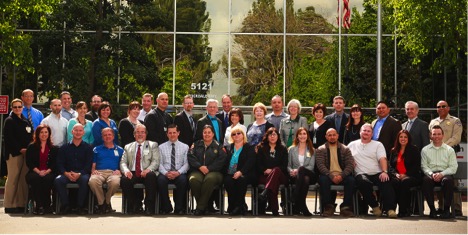
Policy Research Associates Inc. (PRA), the operator of SAMHSA's GAINS Center, facilitated a Sequential Intercept Mapping (SIM) Workshop March 8-9, 2016, in Bakersfield, CA. PRA Senior Project Associates Dan Abreu and Travis Parker led the workshop. 30 people participated in the workshop including representatives from Kern County Mental Health, Kern County Sheriff's Office, Bakersfield Police Department, Kern Housing Authority, California Highway Patrol, California Department of Corrections and Rehabilitation, Kern County Probation Department, Superior Court of California, and the National Alliance on Mental Illness.
During the workshop participants identified:
| • | resources that address current service gaps | ||
| • | areas needing improved collaboration | ||
| • | key priorities to enhance current services and improve access to treatment |
The group generated a list of action items, and prioritized those items. Some of the priorities that the group identified included: increasing the capacity of the existing Mobile Evaluation Team (MET) and related crisis services, educating the public about the availability of 211 – a county helpline that provides information and referrals to community resources, and increasing the availability of services in nearby rural areas.
The GAINS Center will provide a map of the criminal justice system in the county, as well as a report that includes findings and recommendations. The GAINS Center will continue to work with the community in the future to prevent justice involved individuals from entering the criminal justice system and/or minimize penetration into the criminal justice system.
Read Kern County Mental Health's Official Press Release
Safety and Justice Challenge Grantees Announced

The John D. and Catherine T. MacArthur Foundation recently announced nearly $25 million in support for plans to create fairer, more effective local justice systems across the country. The MacArthur Foundation is awarding 11 jurisdictions grants between $1.5 million and $3.5 million over two years to reduce their jail populations and address racial and ethnic disparities in their justice systems. An additional nine jurisdictions will each be given $150,000 grants to continue their reform work and to participate in a growing, collaborative network of cities, counties, and states driving local justice reform.
The grants are part of the Safety and Justice Challenge, a national initiative supported by the Foundation with an initial $75 million to reduce over-incarceration by changing the way America thinks about and uses jails. The Challenge is establishing a network of jurisdictions to model and inspire effective local criminal justice reforms across the country. Last May, MacArthur chose 20 jurisdictions for initial grants and expert counsel to develop plans for reform after a highly competitive selection process that drew applications from nearly 200 jurisdictions in 45 states and territories. All 20 of these Safety and Justice Challenge Network jurisdictions will be eligible for further funding. Depending on continued commitment and significant progress, sites receiving implementation awards will be eligible for additional funding after the initial two years. The remaining jurisdictions are encouraged to sustain their momentum for reform and will be considered for implementation support in 2017.
The 11 jurisdictions receiving funding to implement their plans are representative of jails and local justice systems across the country. They range from large cities like Philadelphia and New York City to smaller and mid-sized localities like Pima County, Arizona, and Spokane County, Washington. This diversity of sizes, geographies, demographics, and challenges will produce a variety of innovations and models for reform that communities across the United States can adopt.
In their work, each of the 11 jurisdictions will focus on safely driving down jail usage and reducing racial and ethnic disparities through projects, programs, and reforms that will vary based on local contexts. Many will launch initiatives to address the disproportionate consequences of local justice systems for people too poor to post bail or who struggle with mental health or substance abuse issues. The jurisdictions' plans employ an expansive array of local solutions, such as alternatives to arrest and incarceration, implicit bias training for law enforcement and other system actors, and community-based treatment programs. Each of the jurisdictions will place an emphasis on community engagement and collaboration with local law enforcement, corrections officials, prosecutors, defenders, judges, and other stakeholders in their work to drive reform.
Eleven jurisdictions will receive grants between $1.5 million and $3.5 million and access to expert technical assistance to implement their plans for reform over two years:
Nine jurisdictions will receive $150,000 grants and access to expert technical assistance in 2016 to continue their local reform work and participate actively in the Safety and Justice Challenge Network:
| • | Ada County, ID | ||
| • | Cook County, IL | ||
| • | Los Angeles County, CA | ||
| • | Mecklenburg County, NC | ||
| • | Mesa County, CO | ||
| • | Multnomah County, OR | ||
| • | Palm Beach County, FL | ||
| • | Pennington County, SD | ||
| • | Shelby County, TN |
Despite growing national attention to the large number of Americans confined in state and federal prisons, significantly less attention has been paid to the local level, where the criminal justice system primarily operates and where over-incarceration begins. Jail populations have more than tripled since the 1980s, as have the cumulative costs of building and running them. Nationwide misuse of jails most harshly impacts low-income communities and communities of color. For example, while African Americans and Latinos make up 30 percent of Americans, they make up 51 percent of the U.S. jail population. Today, one in three Americans believes his or her local justice system is unfair, according to a poll conducted by Zogby Analytics and supported by the Foundation. MacArthur launched the Safety and Justice Challenge in February 2015 to address these issues by creating fairer, more effective local justice systems and spurring national demand for reform.
Several of the nation's leading criminal justice organizations will provide technical assistance and counsel to the jurisdictions: the Center for Court Innovation, Institute for State and Local Governance at the City University of New York, Justice Management Institute, Justice System Partners, Vera Institute of Justice, Pretrial Justice Institute, and W. Haywood Burns Institute.
Joint Adult Drug Court Solicitation to Enhance Services, Coordination, and Treatment


The Substance Abuse and Mental Health Services Administration (SAMHSA), in collaboration with the Bureau of Justice Assistance (BJA) at the Department of Justice (DOJ), is accepting applications for fiscal year 2016 grants to build and expand the evidence-based substance abuse treatment and recovery support services of adult drug courts. This joint initiative promotes comprehensive strategies for enhancing drug court services and substance abuse treatment. Applicants will submit one application to compete for two jointly-awarded grants – one from SAMHSA and the other grant from BJA.
SAMHSA expects that 10 grantees will be awarded up to $325,000 per year for up to three years, with additional funding coming from DOJ. The actual award amounts may vary, depending on the availability of funds.
Who Can Apply: Eligible applicants are limited to states or state courts applying on behalf of a single local jurisdiction; local court; county; other unit of local government; or Indian tribal governments (as defined under the Indian Self Determination Act, 25 U.S.C. 450b(e)); Indian tribal governments may apply directly or through other public or not-for-profit private entities. Please see Section C of the Request for Applications for complete eligibility information.
How to Apply: Applicants must go to both http://www.grants.gov and the SAMHSA website http://www.samhsa.gov/grants/grant-announcements/ti-16-005 to download the required documents needed to apply for this jointly funded SAMHSA/BJA grant. Your application must be submitted through http://www.Grants.gov. Please refer to RFA: Section D– Application and Submission Information.
Application Due Date: May 31, 2016, by 11:59 p.m. (Eastern Time). Applications must be received by the due date and time to be considered for review. Please see Section D for submission requirements.
Additional Information: Applicants with questions about program issues should contact Jon Berg at (240) 276-1609 or Jon.Berg@samhsa.hhs.gov (link sends e-mail).
For questions on grants management and budget issues please contact Eileen Bermudez at (240) 276-1412 or FOACSAT@samhsa.hhs.gov (link sends e-mail).
The GAINS Center's Website Has Moved to SAMHSA.gov
As a reminder, the GAINS Center's website has been moved, and is now being hosted along with the new SAMHSA.gov. The GAINS Center's website has also been redesigned, and will be updated and improved over time.
Please take a moment to check out the GAINS Center's new website. The URL or web address has changed, but fortunately anyone attempting to navigate to the old web address will be automatically redirected to the new web address (http://www.samhsa.gov/gains-center).
Many of the resources that were previously available through the GAINS Center's old website are in the process of being added to the new website, and may not be available at this time. If you are looking for something in particular and are unable to locate it, please contact Matthew Robbins at mrobbins@prainc.com.
|
SAMHSAs GAINS Center for Behavioral Health and Justice Transformation is funded by the Substance Abuse and Mental Health Services Administration. Disclaimer: SAMHSAs GAINS Center for Behavioral Health and Justice Transformation develops and distributes E-News with support from SAMHSA. Its contents are solely the responsibility of the authors and do not necessarily represent the official view of SAMHSA. You are currently subscribed to %%list.name%% as: %%emailaddr%%. To unsubscribe send a blank email to %%email.unsub%% |

